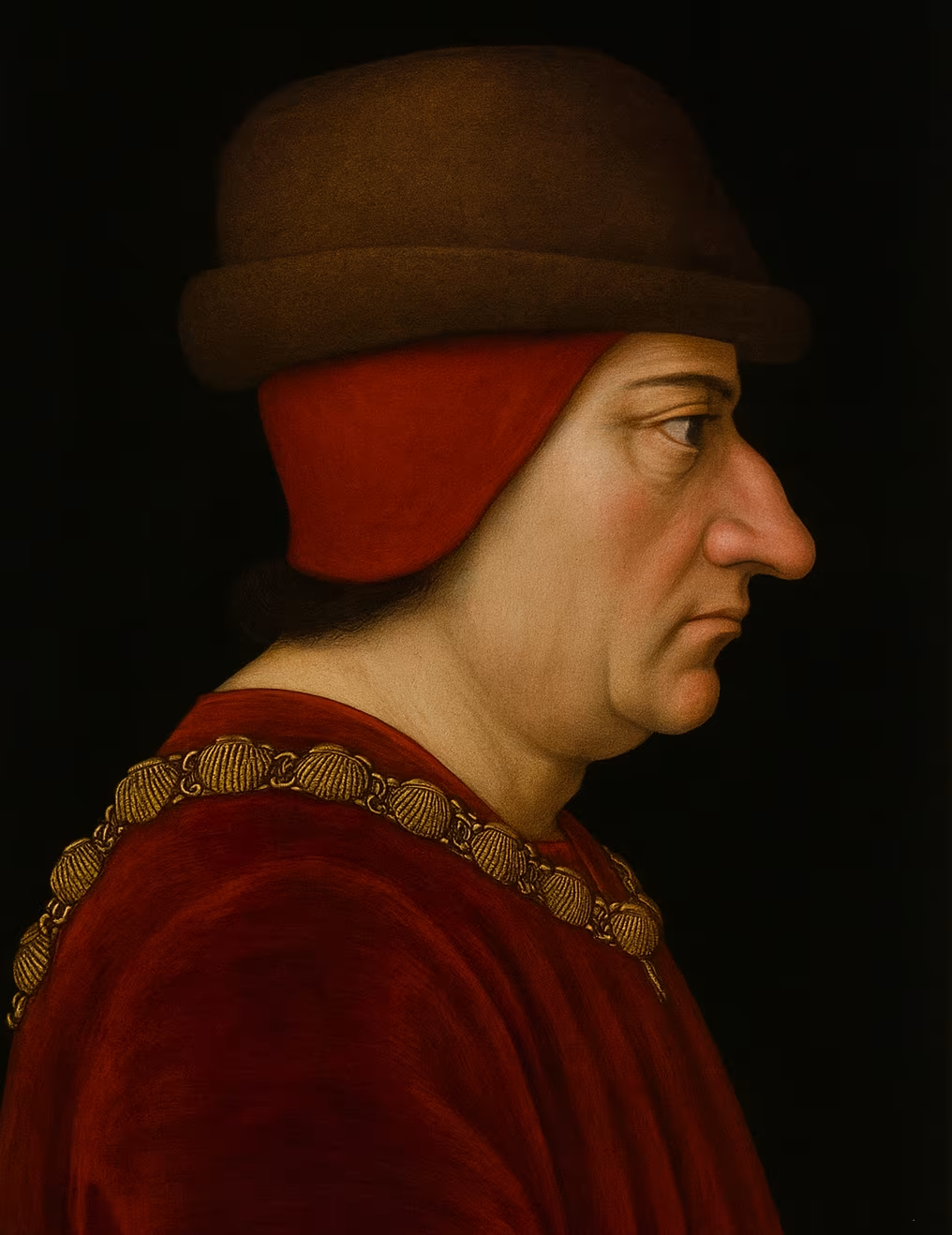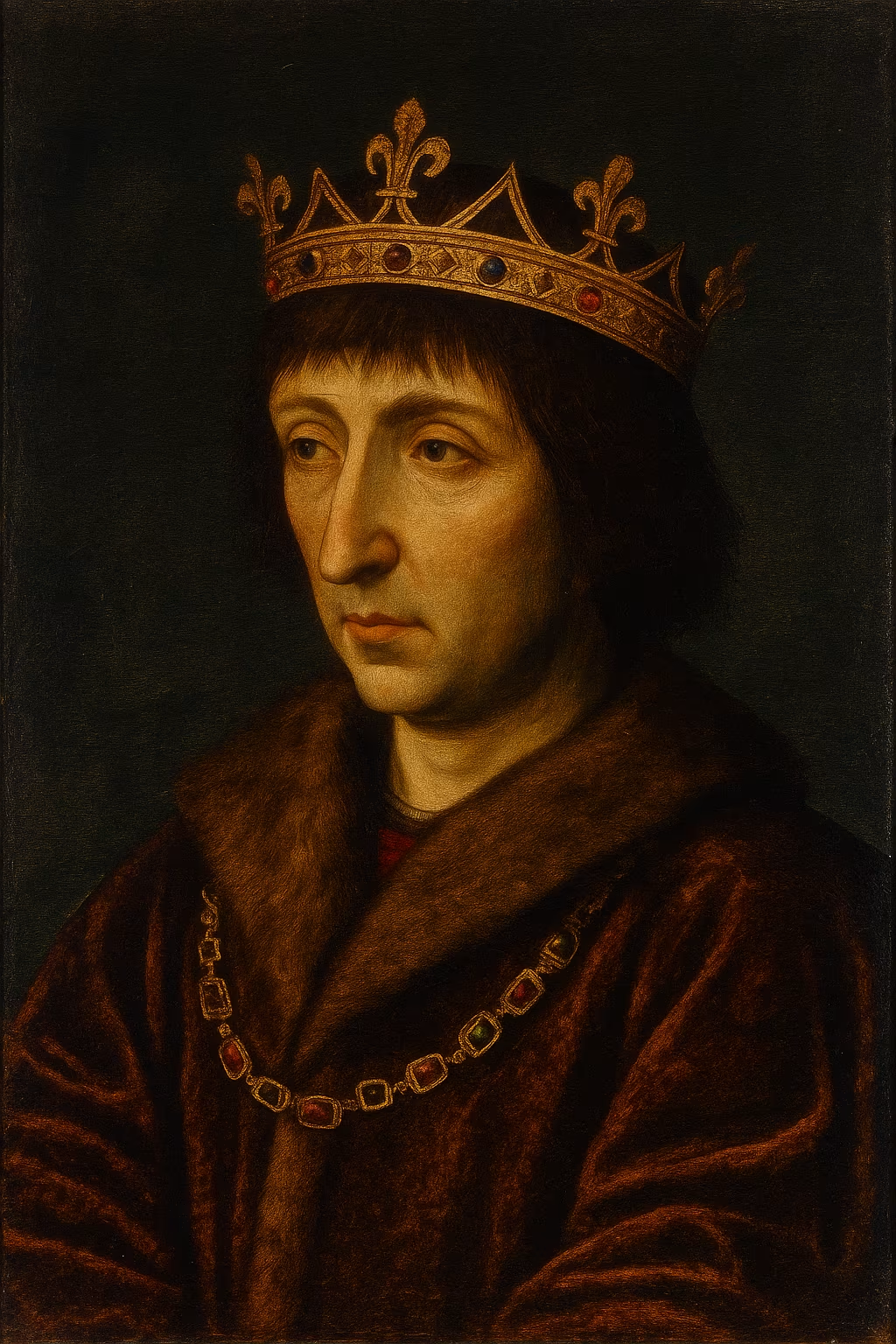Louis XI of France (1423 – 1483)
Quick Summary
Louis XI of France (1423 – 1483) was a king of france and major figure in history. Born in Bourges, Kingdom of France, Louis XI of France left a lasting impact through Defeated the Burgundian state following Charles the Bold’s death (1477).

Birth
July 3, 1423 Bourges, Kingdom of France
Death
August 30, 1483 Plessis-lèz-Tours, Kingdom of France
Nationality
French
Occupations
Complete Biography
Early Life
Louis XI was born in Bourges on July 3, 1423, during one of the darkest periods of the Hundred Years’ War. His father, Charles VII, had only recently reestablished his authority in part of France with the help of Joan of Arc. Louis grew up in an atmosphere of political fragility and distrust. From an early age, he displayed an assertive, calculating temperament and an acute sense of political strategy. Educated by preceptors chosen from among the clergy and administrators of the crown, he received a solid formation in government and theology but always retained a skeptical, pragmatic spirit. His relationship with his father was strained from adolescence: while Charles VII favored loyal servants and a circle of trusted advisers, Louis aspired to exercise power directly. His impatience and independence led to repeated conflicts within the royal family.
Conflict With Charles Vii
Tensions between Louis and his father intensified throughout the 1430s. In 1440, at the age of 17, Louis took part in the revolt known as the Praguerie, an uprising of nobles and princes opposed to the growing authority of Charles VII. The rebellion, poorly organized, collapsed quickly, and Louis was forced to submit. Though forgiven, he was never fully trusted again. Despite this, Charles VII later entrusted him with governing the Dauphiné, giving him some autonomy from the royal court. There, Louis learned the art of administration, diplomacy, and intrigue, surrounding himself with capable advisors and developing networks of informants—traits that would define his reign.
Exile In Burgundy
By 1456, the relationship between father and son had completely broken down. Louis, fearing arrest or confinement, sought refuge at the court of Philip the Good, Duke of Burgundy. Welcomed honorably at Genappe, he observed closely the mechanisms of the Burgundian state—its discipline, its administration, its patronage of arts and commerce. During these years of exile, Louis developed his network of contacts, exchanging letters and maintaining secret correspondence with nobles across Europe. The experience refined his diplomatic subtlety and taught him how to exploit rivalries between powerful houses. His stay in Burgundy lasted until Charles VII’s death in 1461.
Accession And Early Reign
Louis was crowned King of France at Reims on August 15, 1461. His first acts reflected a deliberate break with his father’s policies. He dismissed several of his father’s counselors, abolished many courtly privileges, and surrounded himself with new men, often of humble origin but proven competence—such as Olivier le Daim and Tristan l’Hermite. His style of government was austere and practical, marked by long hours of work and little concern for ceremony. Louis prioritized strengthening royal authority over the great nobility, centralizing justice and finance, and fostering direct loyalty to the crown.
League Of The Public Weal
The sudden concentration of royal power provoked opposition. In 1465, several princes—including Charles the Bold of Burgundy, the Duke of Brittany, and the Duke of Bourbon—formed the League of the Public Weal (Ligue du Bien public). Louis faced them militarily at Montlhéry, where the battle ended without a clear victor. Forced to negotiate, he signed the treaties of Conflans and Saint-Maur, granting temporary concessions to his opponents. But the king’s patience and diplomatic cunning soon undid the coalition: he isolated its members one by one, regaining most of the concessions by political means within two years.
Conflict With Charles The Bold
The rivalry with Charles the Bold, who succeeded Philip the Good as Duke of Burgundy in 1467, dominated Louis’s reign. Charles dreamed of creating an independent kingdom between France and the Holy Roman Empire, while Louis sought to neutralize him through a combination of espionage, alliances, and indirect warfare. The king forged ties with the Swiss Confederation and René II, Duke of Lorraine, encouraging them to resist Burgundian expansion. The Burgundian army’s defeats at Grandson and Morat (1476) were catastrophic, and Charles’s death at the Battle of Nancy in 1477 marked the end of Burgundian independence. Louis promptly annexed parts of the duchy, notably Burgundy proper and Picardy, consolidating French control over the east.
Administrative And Economic Reforms
Louis XI’s domestic policy focused on strengthening the monarchy’s administrative capacity and financial stability. He reorganized the royal council, standardized the collection of the taille (a royal tax), and expanded the authority of royal officers in the provinces. In 1464, he established a network of royal postal relays, one of the first structured communication systems in Europe, ensuring regular exchange of information between the crown and its representatives. Louis encouraged trade and craftsmanship, notably fostering the silk industry in Lyon and protecting merchants from arbitrary taxation. He promoted infrastructure improvements and secured trade routes, contributing to economic recovery after the devastations of war.
Foreign Policy And Diplomacy
Louis excelled in subtle diplomacy. He balanced alliances among England, the Holy Roman Empire, and the Papacy to prevent any single power from threatening France. Following Charles the Bold’s death, he negotiated with the Habsburgs over the Burgundian inheritance, conceding the Netherlands to Mary of Burgundy but maintaining France’s control over Burgundy proper and Artois. Through treaties, marriages, and careful manipulation, Louis expanded France’s influence without large-scale war. His pragmatic foreign policy earned him a reputation for cold calculation but secured the kingdom’s borders for decades.
Later Years And Death
After 1477, Louis XI withdrew increasingly from public life. Plagued by illness and distrust, he spent his final years at the Château du Plessis-lès-Tours, where he lived surrounded by guards and physicians, wary even of his closest advisors. He continued to govern through an immense correspondence network, dictating letters daily. Despite his paranoia, his administrative reforms and diplomatic foresight ensured a smooth succession. Louis XI died on August 30, 1483. His son, Charles VIII, succeeded him under the regency of Anne of France, who preserved his father’s policies.
Legacy
Historians view Louis XI as a transformative monarch who completed France’s recovery from the Hundred Years’ War and dismantled the feudal power structure. Through bureaucracy, diplomacy, and information networks, he transformed the crown into a centralized state capable of sustained governance. His reign bridged medieval feudalism and Renaissance monarchy, laying the institutional groundwork for France’s future dominance.
Achievements and Legacy
Major Achievements
- Defeated the Burgundian state following Charles the Bold’s death (1477)
- Created one of Europe’s first organized postal systems (1464)
- Strengthened royal finances and administrative oversight
- Encouraged silk manufacturing and trade in Lyon
- Consolidated France’s borders and centralized governance
Historical Legacy
Louis XI’s reign marks a turning point from feudal fragmentation to centralized monarchy. His cautious yet relentless methods earned him both fear and respect, securing a strong, unified France ready for the Renaissance and the rise of modern statecraft.
Detailed Timeline
Major Events
Birth
Born in Bourges
Praguerie
Joined noble revolt against Charles VII
Exile
Fled to Burgundy under Philip the Good
Coronation
Crowned King of France at Reims
League of the Public Weal
Rebellion of nobles against royal centralization
Death of Charles the Bold
Collapse of Burgundy and French annexation
Death
Died at Plessis-lès-Tours
Geographic Timeline
Famous Quotes
"He who does not dissimulate does not reign."
"A king is not bound to give account of his actions to anyone."
External Links
Frequently Asked Questions
When was Louis XI born and when did he die?
Born July 3, 1423 in Bourges; died August 30, 1483 at Plessis-lès-Tours.
Why was he called the 'Universal Spider'?
Because of his vast network of intrigue, diplomacy, and intelligence throughout Europe.
What was his greatest rival?
Charles the Bold, Duke of Burgundy, whose death ended the Burgundian challenge to France.
What reforms did he introduce?
He centralized administration, created a postal relay system, and fostered commerce and manufacturing.
Who succeeded him?
His son Charles VIII, under the regency of Anne of France.
Sources and Bibliography
Primary Sources
- Comptes royaux de Louis XI (Archives nationales)
Secondary Sources
- Philippe Contamine, La Guerre de Cent Ans ISBN: 9782213024810
- Paul Murray Kendall, Louis XI ISBN: 9780393007114
External References
See Also
Related Figures
Specialized Sites
Batailles de France
Discover battles related to this figure
Dynasties Legacy
Coming soonExplore royal and noble lineages
Timeline France
Coming soonVisualize events on the chronological timeline
